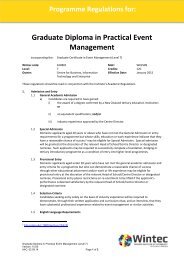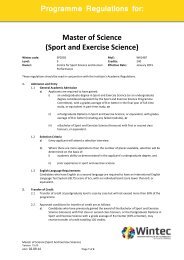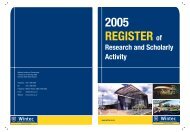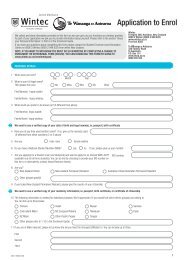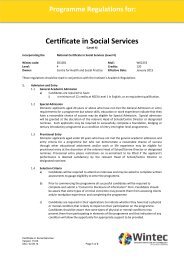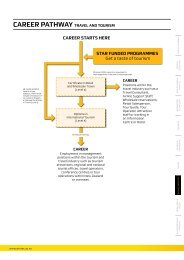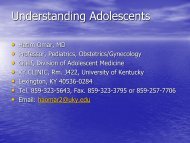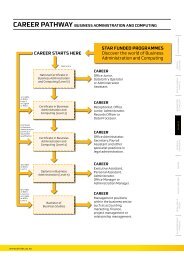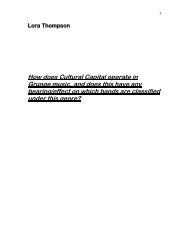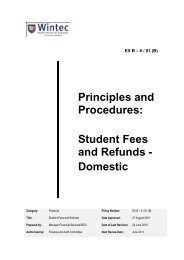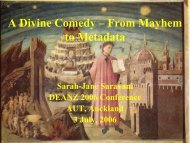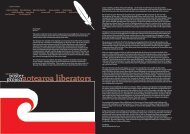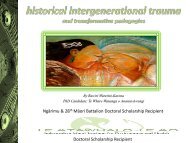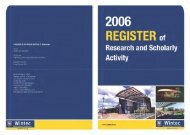PDF - Wintec Research Archive
PDF - Wintec Research Archive
PDF - Wintec Research Archive
Create successful ePaper yourself
Turn your PDF publications into a flip-book with our unique Google optimized e-Paper software.
“Defined as a series of events<br />
perpetrated on a group of people and<br />
their environment with intent to<br />
systematically eradicate them "<br />
(Walters, K, 2012).
Governor<br />
Rights of British people<br />
Sovereignty<br />
Customary Native title<br />
Tangata<br />
Whenua<br />
Worldview<br />
Shared<br />
Space<br />
Tangata Tiriti<br />
Worldview<br />
Te Tiriti O Waitangi 1840 –foundation:<br />
He Whakaputanga 1835<br />
Trade & technology<br />
Land & resources<br />
Lands designated for<br />
Maori<br />
Customs, beliefs, culture<br />
(Treaty education, 2006)
Treaty of Waitangi violations Legislative - Critical Analysis<br />
Breaching TOW – To confiscate Land & resources<br />
Consequences of Breaching TOW for Tangata Whenua<br />
Native lands Act 1862 designed to break down<br />
communal ownership.<br />
Native reserves Act 1864: All remaining reserve land<br />
put under settler control of the Crown.<br />
Breaching TOW - By Blocking all forms of redress & accountability<br />
for fraudulent actions<br />
Legislation used to acquire land and resources<br />
Consequences of Breaching TOW for Tangata Whenua –<br />
Suppression of Rebellion Act 1863<br />
• No right to trial before imprisonment. Its intention<br />
was to punish certain tribes for perceptions of<br />
rebelling against the Crown.<br />
• Legislation used to block all avenues of redress or<br />
compensation by arresting any Māori who<br />
protested.<br />
Breaching TOW – Using legislation to Assimilate & subjugate<br />
Māori culture / language & identity.<br />
Consequences of Breaching TOW for Tangata Whenua<br />
The Native Schools Act: 1867<br />
• Schools would assist in the process of assimilation. 1871<br />
• A Government stipulation that instruction in Native<br />
Schools had to be in<br />
• Tohunga Suppression Act: 1908<br />
• Penalties were imposed on tohunga (experts in Maori<br />
medicine and Maori spirituality).<br />
• Legislation used to assimilate language, culture &<br />
identity
Personal<br />
context<br />
Institutional<br />
context<br />
Societal<br />
context<br />
Historical<br />
context.<br />
(Karena, R, D,W, 2012)
Front middle three: NZ Prime Minister Richard Sedden, Māori King Mahuta, Te Nahu Te Kuri Waretini Wetini<br />
1892
Contextualizing historical intergenerational trauma in genealogy<br />
Generation 4<br />
1840 - 1940<br />
Relationship with<br />
the Colonials<br />
Great Grandfather:<br />
Te Nahu Te Kuri Waretini-<br />
Weteni.<br />
Fought in the Waikato invasion against the British<br />
empire1863<br />
Exiled with King Tawhiao into the King country.<br />
Fought along side Rewi Maniapoto and Tuhoe at<br />
Orakau Pa<br />
Legislative Violations:<br />
Native Lands Act<br />
Suppression of Rebellion<br />
Act 1863<br />
Waikato Invasion<br />
Native Schools act<br />
Tohunga suppression Act<br />
Generation 3<br />
Grand Father:<br />
Brought up by Princess Te Puea<br />
Legislative violations:<br />
1920’s-1989<br />
Aftermath of<br />
colonial<br />
assimilation<br />
Kapa (Tom) Te Wharua Waretini<br />
Weteni<br />
Helped build Turangawaewae Marae<br />
Spoke Maori but was caned and punished in<br />
school.<br />
Fought in World War Two<br />
Moved away from Māori culture for western<br />
religion<br />
Native Schools Act 1867<br />
Tohunga Suppression Act<br />
1908<br />
Native Health Act 1909<br />
WW2<br />
Hunn Report 1961<br />
Generation 2<br />
1946 – 1996<br />
Once were<br />
Warriors<br />
generation<br />
Father:<br />
Raymond Bartholomew<br />
Waretini Karena<br />
Welder-Boilermaker<br />
Under valued anything Maori<br />
Didn’t learn tikanga<br />
Put his friends before his family<br />
Beat and abused his wife and children<br />
Was not taught any principles so did not instill<br />
values or ethics into his children<br />
Legislative Violations:<br />
Hunn Report 1961<br />
Pepper potting system<br />
Rural to Urban migration<br />
Generation 1<br />
Mokopuna:<br />
Grew up with no identity<br />
Legislative Violations:<br />
Rediscovering<br />
cultural heritage<br />
Rawiri-David-Waretini-Junior<br />
:Karena<br />
Musician - Lecturer:<br />
Did not know native language or culture.<br />
Decided to change the cycle<br />
Chased an education<br />
Went to rediscover cultural heritage<br />
Pu Ao Te Atatu<br />
NZ Constitution Act 1986<br />
Fore shore & Seabed 2004<br />
Takutai Moana Bill 2010<br />
Oil drilling<br />
Fracking<br />
TPPA
Key<br />
Great Grand Father<br />
Great Grand Mother<br />
Death<br />
Grand Father<br />
Grand Mother<br />
Violence<br />
Prison<br />
Father<br />
Mother<br />
Alcohol<br />
Elder brother<br />
Elder sister<br />
War<br />
Younger brother
• The native idea of<br />
historical trauma<br />
involves the<br />
understanding that<br />
the trauma occurred<br />
in the spirit or soul…<br />
( Duran, E, 2006,<br />
p.7).<br />
Rawiri & Dr Eduardo Duran 2012
• “Epigenetic research<br />
has discovered that<br />
at a cellular level,<br />
stress from one<br />
generation can be<br />
carried to the next<br />
generation (Walters,<br />
K, 2012).<br />
Rawiri & Dr Karina Walters
Historical Intergenerational Trauma<br />
Stress Coping Substance abuse<br />
Socio-cultural<br />
influences<br />
Socio-<br />
Environmental<br />
Influences<br />
CULTURAL BUFFERS<br />
Cultural identity<br />
Ethnic pride<br />
Family-Whanau systems<br />
Alcohol & or<br />
Dug abuse<br />
Socio-Economic<br />
Influences<br />
By Walters, K & Simoni, 2002)
Tuakiri o te Tangata<br />
Poutama:<br />
Framework<br />
Pōwhiri Poutama<br />
Pūrakau Model<br />
Tikanga<br />
Ethical Value<br />
Te Whare Tapa Wha<br />
Māori Ethics<br />
Ethical Practice<br />
Support Networks<br />
Hauora Oranga<br />
Outcomes<br />
Preferred story<br />
& strategies for wellness<br />
Whakaoranga<br />
Āria:<br />
Theory<br />
Rauemi:<br />
Process<br />
Tukanga:<br />
Structure<br />
Kaupapa Māori worldview<br />
Guiding Principles<br />
Te Whiuwhiu o te Hau<br />
Māori counselling session<br />
Whakatau<br />
Protection & safety plan<br />
Whakapuaki<br />
Whakatangitangi/<br />
Whakaratarata<br />
He kākano āhau<br />
I ruia mai i Rangiātea 1<br />
And I can never be lost<br />
I am a seed, born of greatness<br />
Descended from a line of chiefs,<br />
(Karena, R,D,W, 2012)
Whakaotinga<br />
Whakaoranga<br />
Whakaratarata<br />
Whakatangitangi<br />
Whakapuaki<br />
Mihi Whakatau<br />
Effective closure<br />
To implement action<br />
plan<br />
To develop action<br />
plan & strategies<br />
To shed tears/ to<br />
bring fourth maemae<br />
Establish issues<br />
Whakamoemiti<br />
Establish Relations<br />
Spiritual/Mental<br />
Preparations<br />
By Paraire Huata
=<br />
From tapu- or sacred<br />
To noa- or desecration
Age Period Stage Characteristic<br />
0 – 15yrs Tiaki<br />
(Cared for)<br />
The story of development begins with the stories of<br />
others, who ‘author’ the ‘preface’ and<br />
‘introduction’ of a person’s life.<br />
15 -25yrs Taraia<br />
(Experimentation)<br />
The life story experiments with various ‘plots’. It<br />
depends less and less ‘editing’ by others for<br />
provision.<br />
25 – 50yrs Tino Rangatiratanga<br />
(Self-determination)<br />
The story of development takes on its own life<br />
where choices are made about with whom one<br />
becomes a ‘co-author’. Decisions are made about<br />
the ‘storyline’ of the following ‘chapters’.<br />
50 – 65yrs Arotakenga<br />
(Evaluation)<br />
The story writes into its history new ‘editions’<br />
depending to whom the story is being told. It also is<br />
a time of reflection and evaluation<br />
65 – death Whanau Whanui<br />
(Extended family)<br />
Moments in one’s life story are highlighted in a<br />
‘biography’, like a ‘movie’ being played in one’s<br />
mind. Enjoying and depending on family becomes<br />
significant<br />
Elkington, J.(2001)
0 15 15 25<br />
25 50<br />
50 65 65 Till death<br />
Tiaki<br />
Taraia<br />
Tino<br />
Rangatira<br />
tanga<br />
Arotakenga<br />
Whanau whanui<br />
Pūrakau Model:<br />
= Spaces of time in ones life<br />
= The fractured Wairua
Wairua<br />
Spirit<br />
Hollow<br />
Misery<br />
Hinengaro<br />
Thoughts<br />
Broken spirit<br />
Apprehension<br />
Insignificant<br />
Despair<br />
Fracture<br />
Unloved<br />
Shame<br />
Fear of being touched<br />
Can’t communicate with others<br />
Tinana<br />
Physical<br />
Non-trusting<br />
Humiliation<br />
Whanau<br />
Environment
Coloured perceptions due to trauma
• Spiritual problems need spiritual solutions<br />
(Duran, 2012).
Iho Matua<br />
In what way do you connect to others?<br />
Mana<br />
How would you describe<br />
your worth as a person?<br />
Mauri<br />
What is your understanding of<br />
your own life essence?<br />
Waihanga<br />
What talents/coping strategies<br />
have you fostered to deal<br />
with the issue?<br />
Wehi<br />
How would you describe yourself<br />
when compared to your peers?<br />
Tapu<br />
What does the word<br />
sacred mean to you?<br />
Ihi<br />
Tell me a little about<br />
your personality?<br />
Noa<br />
What is it that you do<br />
to fit in with society?<br />
Hinengaro<br />
How do you cope in terms of processing<br />
information when feeling overwhelmed?<br />
Ngakau<br />
Emotionally, how has this<br />
experience impacted?<br />
Whatumanawa<br />
What is it that you hold most dear to you?<br />
Pumanawa<br />
What traits, skills have you genetically<br />
inherited that have enabled you to<br />
respond to the issue?<br />
(Manawaiti & Mataira, 1981)
Track back to original source<br />
Set parameters in the<br />
future<br />
Unpack issue; examine,<br />
explore, analyze impacts &<br />
ramifications, identify<br />
preferred story & strategies
- + =<br />
Whakamana<br />
He kākano āhau<br />
I ruia mai i Rangiātea 1<br />
And I can never be lost<br />
I am a seed, born of greatness<br />
Descended from a line of<br />
chiefs,<br />
He kākano āhau
Having<br />
limited<br />
knowledge<br />
Becoming<br />
more proactive<br />
with<br />
indigenous<br />
issues<br />
1<br />
5<br />
Transforming<br />
self, family,<br />
community<br />
2<br />
3<br />
Gaining<br />
knowledge<br />
Reclaiming<br />
indigenous<br />
position<br />
4<br />
Impact of<br />
learning<br />
about<br />
Ancestors<br />
Karena, R, D,W, 2012)
Karena, R, D,W, 2012)
•Incorporate Māori traditional healing<br />
approaches into counselling interventions<br />
•Implement an intergenerational transfer<br />
based on a positive position at hapu and iwi<br />
level<br />
•Take charge of our historical, present and<br />
future wellbeing.<br />
•Link into international Indigenous<br />
networks to become transformative across<br />
the global Indigenous world.
Duran, E.(2012). Historical Trauma Presentation. Department of Education,<br />
University of Auckland. Auckland New Zealand.<br />
Duran, E. (2006). Healing the soul wound: Counseling with American<br />
Indians and other Native Peoples. New York, NY: Teachers College Press.<br />
Karena, D,W.(2012). Takitoru; from parallel to partnership. Retrieved<br />
November 20 2012 from:<br />
http://www.journal.mai.ac.nz/content/takitoru-parallel-partnership<br />
Treaty Educations for migrant groups. (2006). Tangata Tiriti- Treaty People:<br />
An interactive workbook on the Treaty of Waitangi. Auckland: New Zealand.<br />
Auckland Workers Educational Association.<br />
Walters, K. .(2012). Historical Trauma Presentation. Department of<br />
Education, University of Auckland. Auckland New Zealand.<br />
Walters, K. (2012). Embodiment of historical trauma and micro-aggression<br />
distress.[Motion picture]. Retrieved March 28 2012 from:<br />
http://www.youtube.com/watch?v=WzPNWTD56S8



